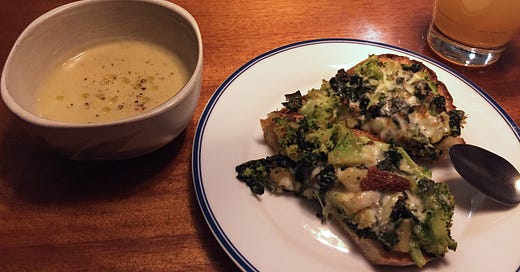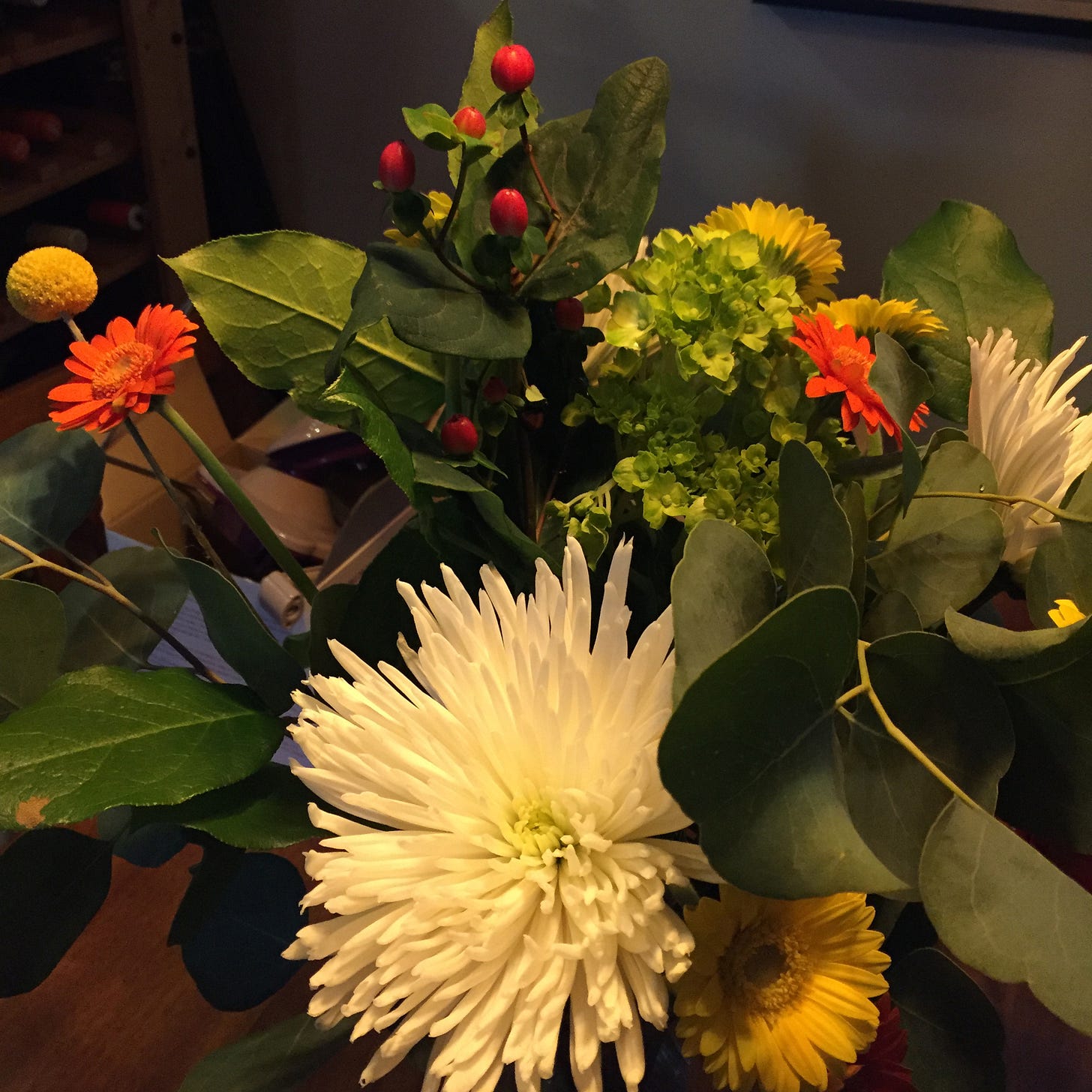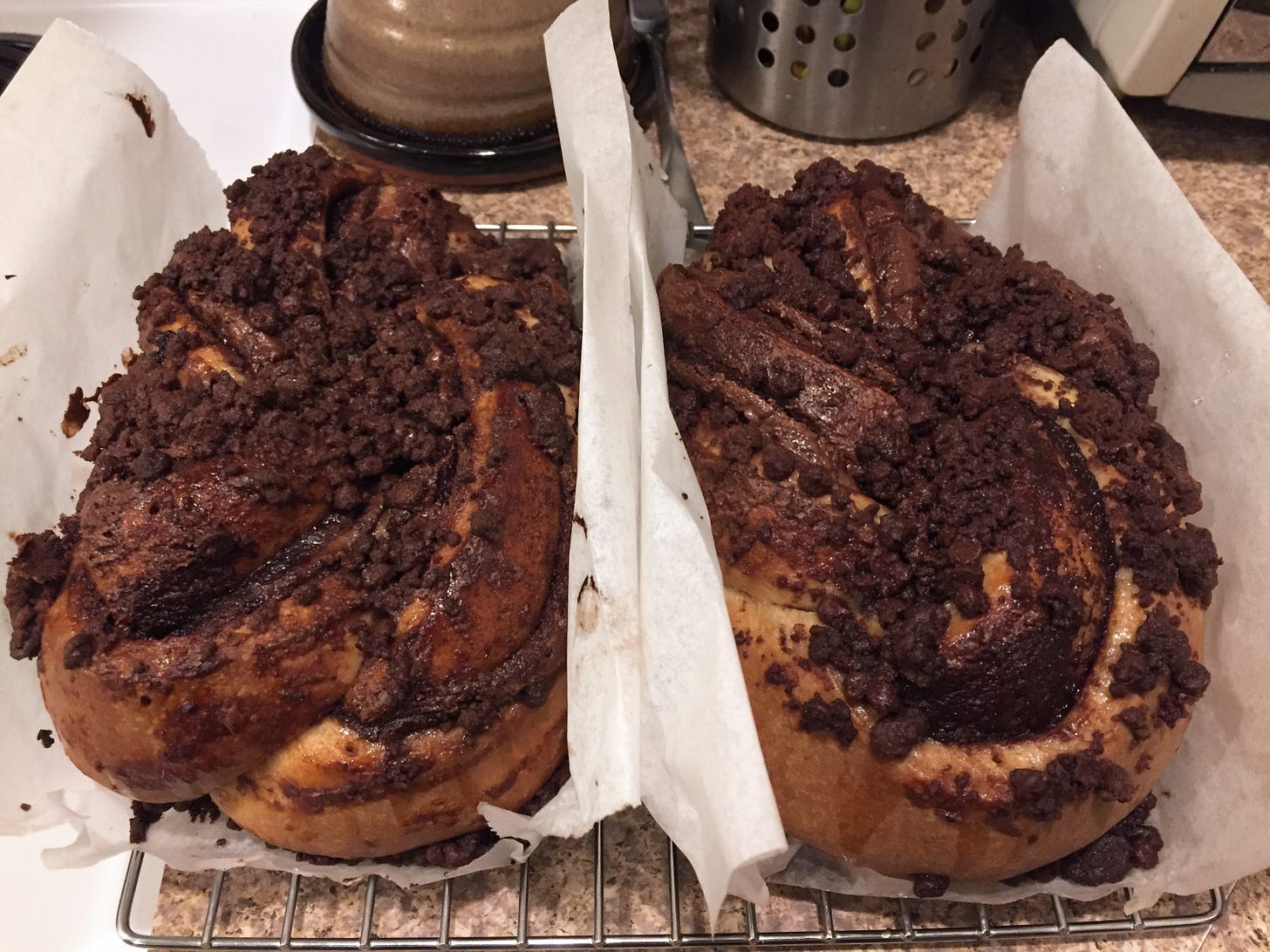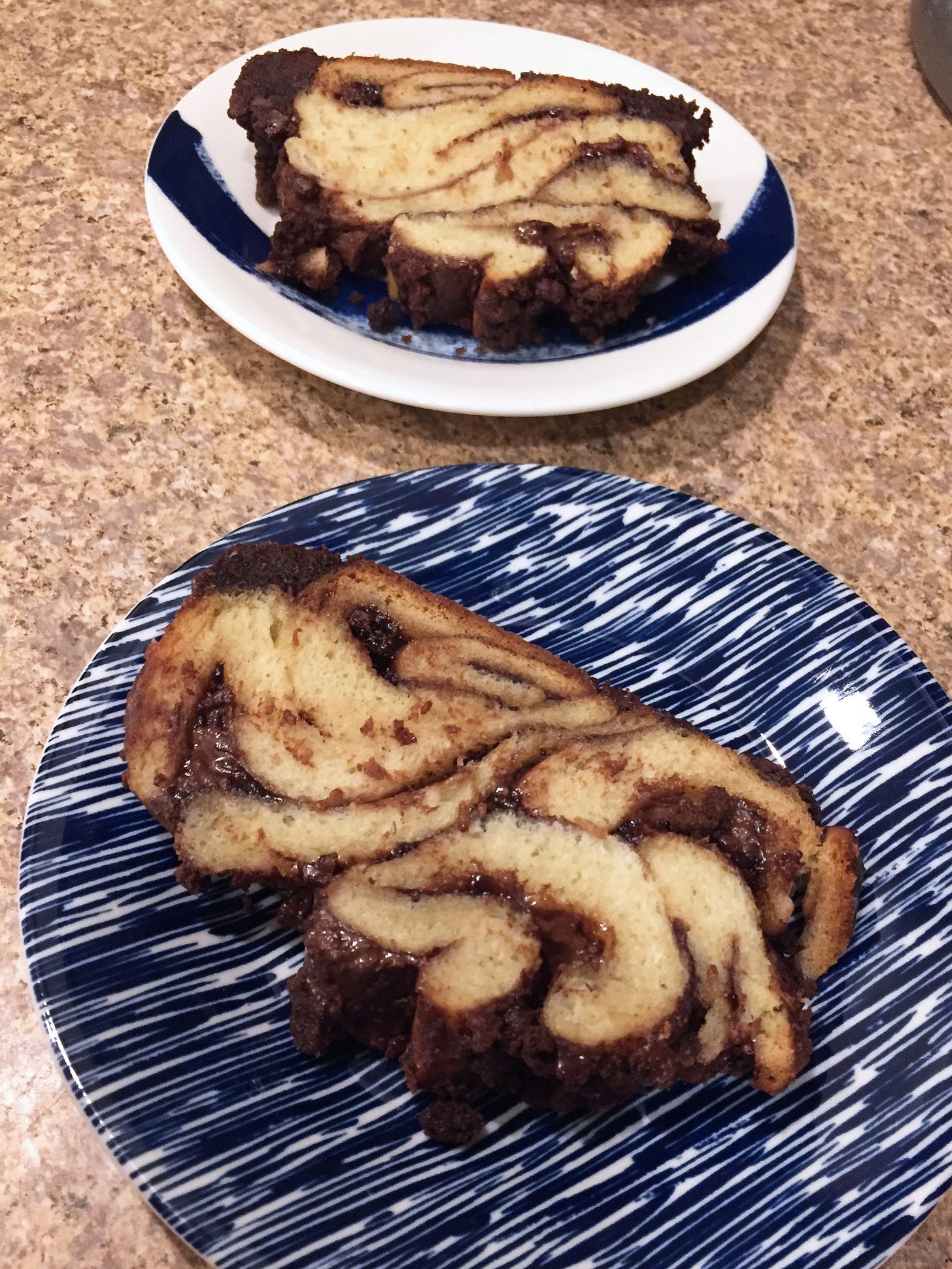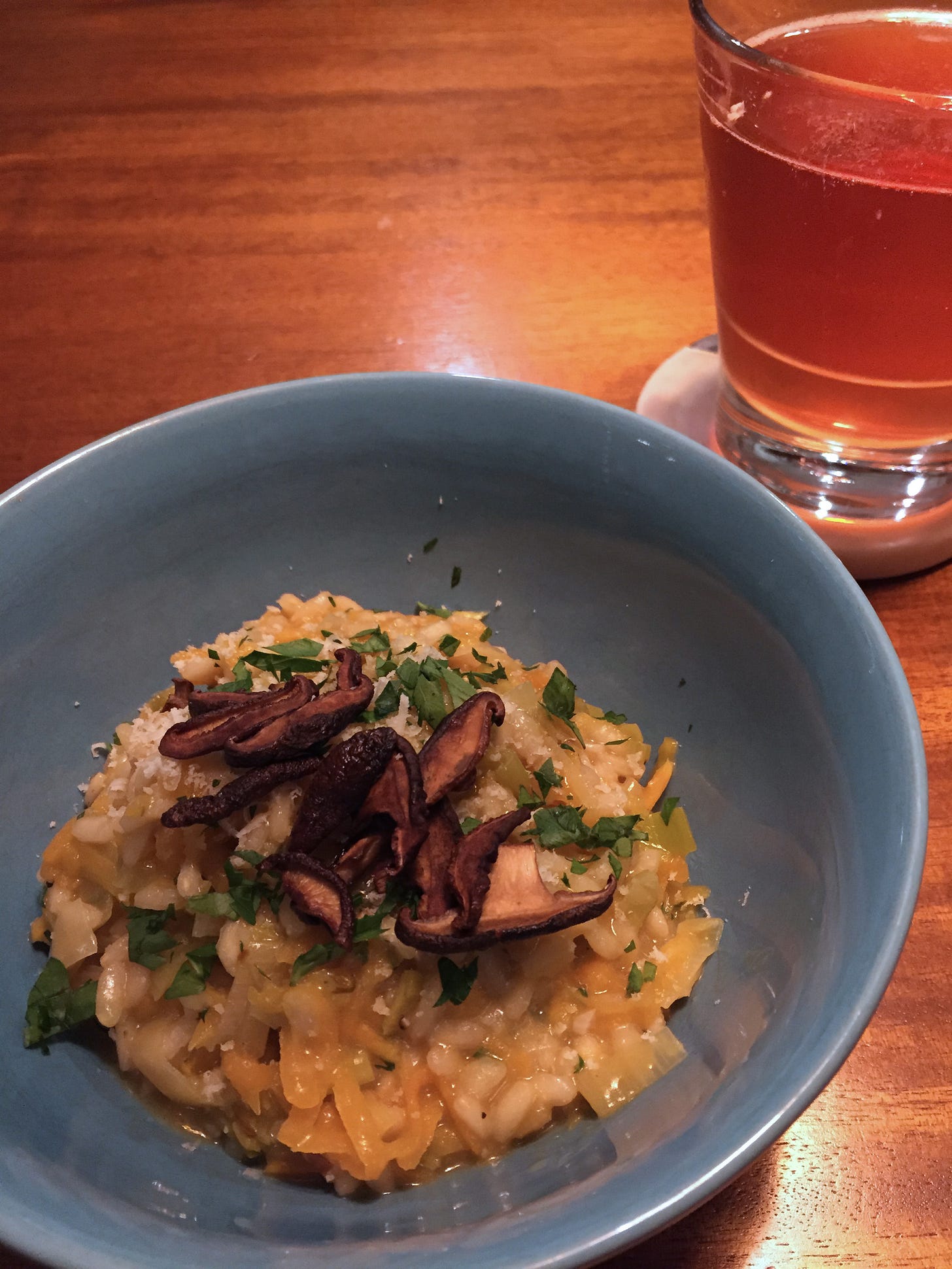Hello from the outskirts of the polar vortex. I hope that wherever you are, you are warm and safe (personally my feet and hands haven’t been warm outside of the shower since October, but that’s just how it is). The weather here has gone back to its usual chilly, grey rain after a cold snap and a little snow, and although it’s kind of tiring to be facing weeks of more rain, at least no one in the lower mainland has to worry about their pipes freezing. We had one nice sunny day between the snow and the rain, and I’m already looking through the West Coast Seeds catalogue, thinking about what to grow in my vegetable garden this spring. But in the meantime, here are some cold-weather foods I enjoyed making this week.
The snowy weekend activated my primal domesticity instincts, and I spent a good chunk of time cooking, pickling, and baking. With most of an enormous red cabbage in my fridge waiting for me to think of things to make with it, I remembered the delicious pickled cabbage at Nuba, and made a jar. It’s been too long since I’ve eaten at Nuba, so I can’t be sure how similar it is, but it’s delicious. I ran out of pickled red onions on Saturday, so I made another batch on Sunday. And I finally tackled the chocolate babka, which has been in my quarantine baking queue since April or May of last year.
As the recipe warns, this is no small undertaking: a 2-hour rise followed by an overnight cold ferment, followed by the filling and topping ingredients and the assembly, and yet another rise before you can put it in the oven, let alone eat it. It makes two loaves though, so for the work involved the reward is fair (I put one in the freezer and am already thinking about taking it out, because we finished the first loaf in 2 days). On Saturday I made the dough in the background while getting dinner ready so it could spend the night in the fridge. And I chose to go the Nutella route instead of making the fudge filling, mostly just because I already had it and it meant one less step, but there were also some comments saying they found the homemade filling thin and somewhat difficult to work with in the assembly process (I imagine some fridge time would fix this).
It seems impossible that there was once a time when I hated making and working with dough, as I now consider it one of the finest pleasures the kitchen has to offer. Forming the coils was pretty fun, and there’s plenty of time during the rise to prepare the streusel— I added a bit of cinnamon— and the simple syrup. The syrup step isn’t strictly necessary, but it adds extra moisture and gloss to the loaf, so I went for it. I always have trouble with things that involve a rise in which the dough doesn’t fully double, because it always seems the same to me after the indicated time. But I put it in the oven anyway, and although I didn’t get exactly a proper loaf shape, it puffed up nicely! It was difficult to wait for it to cool somewhat before cutting in and having a slice, because it smelled so amazing, but we did try it before it cooled to room temp, and it was absolutely flawless: soft, cinnamon bun-like dough, gooey chocolate filling, and crispy bits of streusel with dark chocolate chips. I can see how an entire Seinfeld plot could be constructed around such a magnificent baked good.
There aren’t many foods I dislike, but when I do, it’s almost always because of the texture. So when I say I’m not the biggest fan of winter squash, you’ll know that it’s not because I don’t like the taste, and that I’m always looking for ways I can enjoy it aside from making it into soup. I was interested to try the squash and leek risotto from Six Seasons, because of the somewhat uncouth aspect of infusing the broth with pieces of squash as well as the innards to add more flavour (I poured it through a strainer after simmering, although the recipe has you just scooping broth out around the solids). The other half of the squash is grated for a faster cooking time, as well as a more consistent texture in the risotto. This is easy enough to do with butternut squash, or maybe delicata, because the skin comes off quickly with a peeler— trying to peel any other type of squash will have you sweating, cursing, and dreaming of the sweet release of death. I made a soup once that called for a peeled acorn squash; it was more than four years ago and it still brings tears of rage to my eyes.
Some of the squash is sautéed at the start of making the risotto, to further infuse its flavour into the dish, and the rest is added at the end to keep its bright orange colour and a lovely crisp-tender texture. With risotto, because of its uniformity, I often like a garnish of something larger or crunchy on top— toasted nuts, crisped prosciutto, fried capers, or roasted pieces of the vegetable you’re using can all be really nice. I had leftover shiitakes from the longevity noodles we made on the weekend, so I made a batch of shiitake bacon while the risotto was cooking: just thinly sliced mushrooms tossed in soy sauce, liquid smoke, and olive oil, and roasted until crisp. The flavours of the squash and leeks complemented each other perfectly, and stirring in some parmesan for creaminess and the bits of smoky, crisp mushrooms on top rounded everything out. Risotto isn’t something you want to start making when you’re already hungry, because it always takes longer than you think it will, so it’s a nice treat to give yourself on the bonus Sunday you get on the Monday of a long weekend: a satisfying that meal that feels just a little bit fancy.
On the other end of the spectrum, few things comfort on a cold day like the humble combination of soup and a sandwich. I made a vegan potato leek soup with a (not vegan) broccoli cheese melt, which turned out to be a great match. The soup originally comes from Isa Does It, but it’s such a basic soup that you don’t really need a recipe: just broth, potatoes, an onion and a leek, some salt and thyme, and a bit of cashew cream. If you’re like me you might think it sounds too plain, and feel the need to add something to it, but aside from a little pepper and maybe a drizzle of olive oil at the end, you really don’t. The potatoes and leeks have so much flavour that this classic is always excellent just as it is— velvety, savoury, and creamy. I like Yukon Golds unpeeled for a slightly rougher texture after blending, but peeled russets will give you a nice smooth soup.
The broccoli toasts are from this recipe, which is really quick and almost perfect: instead of blanching, I just pan-steam the broccoli first, then chop it a bit smaller while the garlic and anchovies are cooking in the same pan. I also added a few chopped kale leaves, since I had them to use up. The lemon zest and the salty anchovy pieces elevate this to a much more interesting dish than you might think steamed vegetables on toast could be, and any excuse to eat melted cheese is a good one in my books. I do think this could be made without the anchovies for a vegetarian version though, or using chopped kalamata olives instead. It was definitely nice to have leftovers of this and the soup when I allowed myself to get too hungry to make dinner the following night.
Media:
The news coming out of Texas is terrifying and enraging. Privatization of power companies and other infrastructure has resulted in icy conditions, low water tables, and loss of power all over the state that cannot be solved by federal diversion. In a sort of reverse situation to how most Vancouver homes don’t have air conditioning, housing in warmer climates is often not insulated in ways that stand up to the extreme weather Texas is experiencing right now, and it’s already becoming fatal. Eater has been publishing information about who has been helping people who are unhoused or without power, and how. In Dallas, mutual aid groups have been providing emergency warming supplies, groceries, and even microwaves for people sheltered in hotels without a way to heat their food. Austin breweries and restaurants are providing potable water during boil-water advisories, and many local restaurants are providing free food.
As power companies jack up prices due to “high demand”, officials tell citizens to “prepare for multiple days” of outages in below-zero temperatures, and elected representatives fly to Mexico or tell their constituents to stop looking for a handout, it’s clear that those in power are never going to value people’s lives over money. The weather crisis has created a food and water crisis, and once again it is the communities that step up to help keep each other safe, warm, and fed. If you can, I encourage you to donate to one of the organizations listed here.
Thanks for reading— if you enjoyed this newsletter, please share it with someone new! I like providing this to you for free, but it does still involve time and effort, and this week I ask that if you can spare it, please donate to a mutual aid fund in your area. Now, who is buying BC craft beers to stock vending machines in Tokyo?
